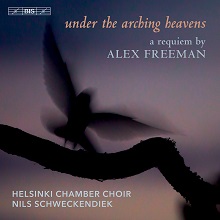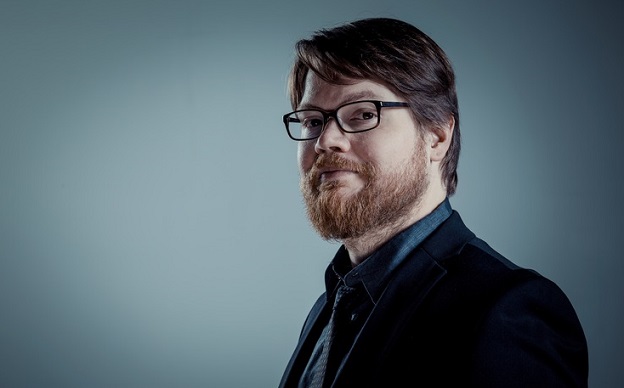Alex, you come from the USA and have lived in Finland for a long time. Which nationality do you feel you belong to more in your capacity as a composer?
It comes up a lot and it’s interesting that it has changed with time. Recently, I was mentioned in a newspaper article as « Yhdysvaltalais-suomalainen säveltäjä », « American-Finnish composer ». I think that’s about as accurate as it can be. I was 29 years old the first time I came to Finland, so I think, as a fully grown American at that point, I am and will always be an American. But I am now a Finnish citizen (I have dual citizenship) with a Finnish wife and two small half-Finnish children permanently living in Finland. So, if someone called me a Finnish composer, I would probably not go out of my way to correct them. But about identity, I am not really sure what all that means anyway. I certainly don’t consciously think of nationality when I write music. I mostly think about the condition of being human.
A Baltic tone – to put it that way – can also be felt in your music. Do you agree with that?
 But the Baltic quality you sense might have something to do with a couple of decades of living here or my innate enthusiasm for Sibelius’s music (I was 12 or 13 when I first heard Sibelius’s Second Symphony and it was kind of like a lightning bolt for me) – who can say, exactly? And there is probably something of Pärt in the atmospheric pacing of some of this music from the requiem.
But the Baltic quality you sense might have something to do with a couple of decades of living here or my innate enthusiasm for Sibelius’s music (I was 12 or 13 when I first heard Sibelius’s Second Symphony and it was kind of like a lightning bolt for me) – who can say, exactly? And there is probably something of Pärt in the atmospheric pacing of some of this music from the requiem.
What does it mean to you to write choral music? What is the attraction? What are the special challenges?
My earliest musical experiences were in choirs and, as an adult, choral singing has been an important part of my professional and personal life. For an immigrant, being a member of a choir is a superb way to get to know the culture and make friends (after all, I met my wife in a Finnish choir). For a composer, it is a natural place for someone who already had an inclination toward melodic, triadic music to develop and refine a musical language. While choirs can be incredibly flexible and inventive, one must at all times consider the voice, the breath, and the ear. In this way, I think my physical connection with the music I write for choir is maybe a little more corporeal than what I might write for an instrumental ensemble.
What is it like for a composer to write a Requiem in the 21st century – and thus to join a long tradition and to be compared with Requiem composers like Mozart, Verdi, or Britten?
Well, of course that is a little daunting, but also kind of inspiring. My relationship to the Latin texts, for instance, is mostly forged by my relationship to musical works that have used those texts. I don’t really interact with those texts as liturgical so much as literary and poetic. I did occasionally reflect on how these words were treated in my favourite requiems, both in structure and prosody. In most cases, if I was conscious of it at all, I tried to avoid being too similar in my approach. But, for instance, the tight structure of Mozart’s Dies Irae movement – short, fast, turbulent and with the first stanza repeated as a refrain – provided a helpful nudge for how to begin the sprawling Sequence in my requiem. And my approach to the Sequence, in retrospect, owes a lot to Britten’s War Requiem. The Dies irae texts are interspersed with poetry that recasts the Latin texts in terms of more contemporary poetry. The interspersed poetry, in turn, selectively interprets and highlights the allegory in the Latin texts.
What significance does the work have in your oeuvre?
The work was commissioned to commemorate an important moment in the history of my adoptive home. I felt I needed the gravitas and universality that the tradition of the requiem naturally carries to say something commensurate with the occasion. That decision also allowed me to kind of get myself out of the way of it – like it was so much bigger than I am, so I am just « relaying the message », to some extent. Does that make sense? This seemed to me to be appropriately respectful.
The second choral work on your CD is called ‘A Wilderness of Sea’. How did the composition come about?
I had been asked to set Shakespeare for the 400th anniversary of his death and I thought that without being too obvious about it I could present something of the universality of the imagery and poetry in the context of the crisis of climate change. It amazes me how prescient some of Shakespeare’s lines look, viewed through that lens. And I wanted there to be a constant sea-like undulation in the music. I am most explicit with the seagull-like sounds in the opening of the piece, but the sense that one is carried along by layers of music swirling and eddying about was something I aimed for.
What inspires you about Shakespeare and the texts on which you based the composition?
‘A Wilderness of Sea’ draws from three of Shakespeare’s most famous works, emphasizing the common thread among those works that addresses two of the most universal aspects of human existence: water and impermanence. In all of western literature it is doubtful that any single poet more artfully or thoroughly contemplated the ephemeral quality of “our little life”. Indeed, we find this theme pervades his most tragic and most comic works. Shakespeare also understood the smallness of mankind in the face of nature, as well as very particular aspects of life in and near the sea. His descriptions and metaphors, as they pertain to the aquatic realm, reflect a remarkably refined perception of the natural world and mankind’s place in it. For instance, his description of the state of a drowned sailor in Full Fathom Five has an almost scientific, chemical ring to it. Likewise, his prescient contemplation of “the hungry ocean” ultimately obliterating even the loftiest structures of mankind represent both a gift for nuance on the microscopic level and drama on the broadest imaginable scale. These words, in the very time in which scientists have warned that the ocean may well rise nearly a meter by the end of this century, resonate in a way that Shakespeare could scarcely have imagined. His was an infinite ocean with unlimited power; ours is an ocean whose limits we have finally begun to reach and which renders our civilisation much in the position Shakespeare describes of Titus Andronicus:
“For now I stand as one upon a rock
Environed with a wilderness of sea,
Who marks the waxing tide grow wave by wave,
Expecting ever when some envious surge
Will in his brinish bowels swallow him.”
Titus Andronicus, Act III, sc. 1
Thank you very much for the interview, Alex.
Link to the Pizzicato review

























